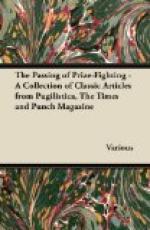Old Parliamentarians will remember the long-continued struggle between Mr. GIBSON BOWLES and a colleague who was always endeavouring to insert “the thick end of the GEDGE” into “Tommy’s” favourite seat. Mr. HOPKINS is the Member who has jumped Mr. BOTTOMLEY’S claim on the present occasion—a fact which will recall THEODORE HOOK’S remark that the game of leap-frog always reminded him of those famous psalmodists, STERNHOLD and HOPKINS.
Wednesday, February 19th.—According to Lord STRATHSPEY there are thousands of men in the Army longing to take Orders in the Church Militant, but there are no funds available for training them, and no prospect of a living wage for them if ordained. The LORD CHANCELLOR’S sympathetic references to the painful plight of men whose duty it was to preach content here and hereafter will no doubt be reflected in the administration of his not inconsiderable patronage. Fortunately or unfortunately the clergy cannot or will not “down surplices” to improve their condition.
The unrest in other sections of the working-classes was further examined from various angles. Lord RIBBLESDALE would like them to take a greater share in the profits, and also in the “responsibilities and vicissitudes” of industry. But this suggestion will hardly appeal to them if, as Lord LEVERHULME declared, Labour would have made a poor bargain if it had swapped its increased wages for all the excess profits made during the War. Lord HALDANE’S view, as perhaps you would expect, was that neither Capital nor Labour, but the “organised mind,” was the principal agent in producing wealth. Altogether it was an informing debate, which the Government might do worse than reproduce in pamphlet form for the instruction of the public.
On the news of the attack on M. CLEMENCEAU reaching the Commons there was a general desire that the House should pass a resolution of sympathy. But Mr. BONAR LAW deprecated the proposal as being, in his opinion, “against all precedent”—not a little to the surprise of some of the new Members, who thought that in a case like this the conseil du precedent might bow to the President du Conseil.
In the procedure debate a strong demand was made that a full official report of the speeches delivered in the six Grand Committees should be issued. But the ATTORNEY-GENERAL pointed out that everything was already reported “except the talk,” and found a powerful supporter in Sir EDWARD CARSON, who believed that no official reports would have any effect in keeping Ministers to their pledges. Hansard is as Hansard does, is his motto.
Thursday, Feb. 20th.—Every question put down costs the tax-payer, it is calculated, a guinea. This afternoon there were no fewer than two hundred and eighty-two of them on the Order-Paper. It would be interesting to see what effect upon this cascade of curiosity would be produced if every Member putting down a question were obliged to contribute, say, ten shillings to the cost of answering it; the amount to be deducted from his official salary. If such a rule had been enforced in the last Parliament Mr. JOSEPH KINO, for one, would have had no salary to draw.




